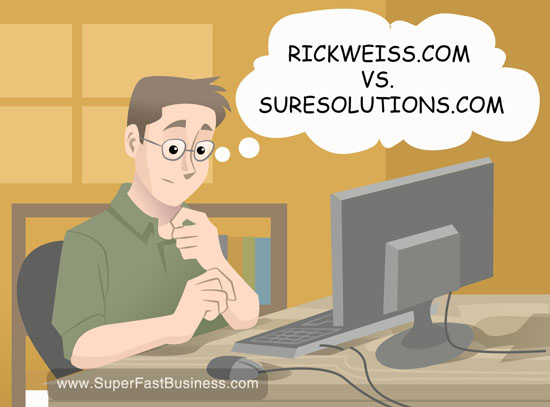Podcast: Download (Duration: 2:25 — 2.3MB)
Get Notified Of Future Episodes Apple Podcasts | Spotify | Amazon Music | Android | Blubrry | Gaana | TuneIn | Deezer | Anghami | RSS | More
This week:
00:08 – Should you blog under your own name or your business?
00:36 – Associate yourself with your brand
01:30 – I’m interested in your take
Be a part of the JamesSchramko Mentoring Program
Transcription:
James Schramko, here. We are going to be talking about whether you should blog in your own name or in your company name.
Own Name Versus Your “Alias” or Business Name
So, it is pretty common these days that you want to build your authority with amazing content and tell the whole world about your message – kind of like what I do here at SuperFastBusiness.com. So, I get students saying “Should I register my own name and blog on that or should I blog under the business?”
Well, of course a lot of this depends on what you are trying to do, which station are you rolling your train towards, which I talked about in a recent episode. Now, I think for most people, you’re better to associate yourself with your brand and assist that brand in building up.
Now, if you want a few case studies on this, what I do is I type into Google something like “Richard Branson blog” and what you’ll find is that it comes up as a Virgin.com site forward slash, Richard Branson and that’s where he blogs. So, he is still being a personality, he still got authority but it’s underneath that Virgin brand. Now, later on, if he decides to sell off Virgin and do something else, then he can style up a blog on his new business.
Direct Your Efforts Towards Your Primary Business
Now, that’s why I think it’s better to put all of your efforts towards less things rather than have this thing there and that thing there and this thing there, direct your attention towards your primary business and that’s why I chose to blog under SuperFastBusiness.com instead of jamesschramko.com.
But, what I’m really interested in is your take on this. Do you have different examples? Do you have different case studies that you’d like to refer to? Please comment below this video, especially link out to examples where you’ve seen it done well and I’d love to start a bit of a debate about this to see what we think is the best practice. But for now, I’ll be redirecting my own domain name right towards this blog. Now, that might change in the future, let’s have a look at the comments and see.
I am James Schramko and I’d like to hear from you.
Subscribe to JamesSchramko on iTunes










James I agree with you for the most part and in some ways I wish I had started my freelancing business as an entity rather than my own name as the domain/business name.
On the flipside though, people want to do business with real people, and when you put yourself out there as the face of your brand, and indeed put your name to it, I think people respond favourably to that. I know I have a pretty good conversion rate on my site and I believe it’s because people can see I’m a real person and not “ABC Copywriting” or something generic like that.
Another downside to having your own name as the domain: when you want to scale the business, say in a few years you want to hire people, e.g. start an agency, and take yourself out of the business, you’re still stuck with your name on the door. I guess you can do what Drayton Bird does and call it Drayton Bird and Associates or similar.
It does seem to limit options somewhat overall so I think you need to balance the human factor with the scalability factor (and as I have heard you say elsewhere you can’t sell the business later when it’s got your name as the domain)!
Initially I registered my own name, then realised that wasn’t a good decision for reasons you mentioned in this video.
Its unlikely that anyone would want to buy johnromaine.com, so instead I chose something more brandable that can be onsold if I so wish.
Hi James – I agree also with what you have said. I have blogs in a few niches that should the opportunity arise I would sell, it most certainly could not work if I blogged under joshgarrod.com. Here is an example of one of my blogs http://www.how2caravan.com
Loving your work
Josh
I think being a touch entrepreneurial, it’s hard to pick one domain and put all your personal blog content under that brand.
Most of your audience I think would be in the same boat: Not knowing exactly what they want to focus on as their primary thing. Having your own name domain allows you to write about a number of different topics and build your credibility while you work out what that one thing is going to be.
You’re not likely to change your name, so you can be 99% sure this domain will be with you for life… and from there you can build out separate websites for different businesses and sell them as a whole without any of your own personal content going with it.
Yes, I think building the brand is important. Agreed man! People will recognize you anyway in your videos and as the author of the post. You build both the brand and your name at the same time!
… and when you send the email out to your list it comes from your “name” so you don’t need it in the domain.
I use my own domain, I have used other names in the past, and am still not sure which way to fully commit :)
FREE INTERNET BUSINESS OPPORTUNITY
Work at home on the Internet. Free quick courses show you how. We supply free training to start your business. There is no cost to you. Start part time and make money in your spare time.
Mousutan, I edited your links – your post is a little spammy wouldn’t you say?
For me it’s quite simple. You could easily fall out of love with what you are doing in business, or you could build something that someone else might want to buy.
If you have your name all over it, it’s hard to shift direction or sell.
The SuperFastBusiness site would be a much more enticing to a buyer than your name.
James,
All great points mentioned in your video.
However, after much thought about this very issue it really depends on the person’s objective.
I reduced the quandary into following, do I: A). Desire to build a global corporation that can serve millions? B). Do I need to be the personality (Meaning, already known in the industry)? or, C). Is my business a local “Mom and Pop” that serves local customers?
Regarding A: Most successful global corporations began with a business name (ie. Apple, Google), the products and services were center stage, not the name of the founder(s) – who became known after the fact.
Regarding B: If the intention is to become known and/or celebrity within a given industry on a global scale and the personality is the main ingredient, then branding in one’s own name is essential (People remember people ie. Oprah, Tony Robbins, Marie Forleo, etc.). Note: Products such as books or events by the personality are largely the offer. Typically, there are not any specific services provided by the personality driven model. Patrons do not choose to fly Virgin Airlines because of Richard Branson (-He just happens to own the service).
Conversely (Regarding C), if the intention is to build a local business serving customers within one’s local area (Where one is competing with other local businesses), having a general business name would be more effective (ie. ABC Plumbing) or one’s own name as a freelance service business (ie. James Schramko Web Design;).
Agree with the point, if the owner’s ultimate exit strategy is to one day sell the business, then a business name with brand potential would be recommended.
Appreciate the discussion!
I went with http://www.ATLweb.com rather than my own name for the web services because like many of my businesses it will be sold one day and I dont need to be a part of it for it to work.
Very interesting post, James. I have a somewhat related dilemma. I do Internet Marketing consulting, but I also own two e-commerce websites. I blog on all of them as myself, but I struggle with it because of user perception if you know what I mean. It also becomes an issue with all the different social media sites. Would like to see what you suggest. By the way, for some reason this comments section didn’t render on Chrome.
I did a little investigation into this when I started my website, and when I start sites for my clients.
The biggest name that I can quickly recall, who blogs under their name. Building up a celebrity status, or a cult following.
http://www.sethgodin.com
It redirects to sethgodin.typepad.com, but it is still name associated rather than business name/entity focussed.
– Fiona
Excellent Fiona. One of the assets of Seth is Squidoo.com
I have another dilemma – my name is long & unspellable, so though I have a personal blog over at mshanhun.com and focus my efforts on http://digitalscrapbookinghq.com
BUT again that’s long and I wish I has the creativity to come up with something awesome and short, and available!
catchy brandables can also be bought second hand if you peruse the auctions.
James, when you first get started online, no one is searching for you (unless you are a celebrity or public figure). So register a domain related to your keywords and after you’ve built some authority or name recognition you can use your name as a domain. Over time, while you build your authority, you’ll see that people are searching for your name more and more, then you can just set up a landing page using your name as the domain and by that time you’ll have other sites you can link out to as well.
Lleane I dont think you need to have keywords for a great domain name… Examples: apple, amazon, wistia, yahoo etc…
Interesting discussion that I think highlights a dilemma that many sole traders and small business owners “miss” when they first start out – that is, “Starting with the end in mind”.
If the goal of a business owner is to build a business up to a point where they can sell it off (in retirement, or to move onto the next project, or whatever) at a healthy profit, then it makes no sense at all to blog under your own name, because when it comes time to sell your business, the “asset” is reduced because the blog posts can’t be sold with the business!!!
If I decide to buy another person’s business, then what value are blog posts to me if they are on the “OtherPersonsName.com” blog?
I would argue that they are of no value whatsoever – so I would be making sure that I did not pay one cent extra for any “good will” when negotiating a purchase price for the business.
On the other hand, if this same person had been blogging at “OtherPersonsBusinessName.com” for several years and had a large and loyal follower base, then the asking price for the sale of the business can be substantially increased as the “asset” is now huge due to the size and loyalty of the following.
As the new owner of the business, I can continue to blog under the business name and as long as I don’t change the “theme” or “principals” behind the posts, no-one would ever know that the business had changed hands.
If, however, when I first start my business, my intention is to simply secure myself a “job” until I decide to retire, then simply close the business down when I have had enough, the domain name for any blog posts is irrelevant, because I do not need an “asset” to sell at the end of the process.
Either way, the most important factor (in my opinion) is knowing what the “end of the road” looks like at the start of the process.
it sure does help to start with the end in mind. A lot of businesses don’t really know that and may not be able to know fully especially if they are a lean start up and the pivots take them away from where they start or could have imagined.